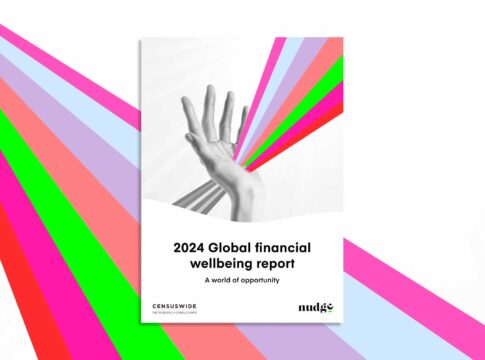- Gen Z employees are more confident than older groups when it comes to reaching their financial goals
- Social media plays a key role in their financial literacy and attitudes towards key areas such as saving and spending
- Experts warn this may be a false sense of security, with some concerning financial habits emerging amongst Gen Z
Gen Z is the most ‘financially confident’ demographic, according to new research examining the financial wellbeing of workforces across the globe.
nudge Global asked over 11,500 employees, across 17 countries, if they expected to achieve their financial goals as part of its annual Global Financial Wellbeing Report.
The results revealed a negative link between financial confidence and age. Almost two-fifths (38%) of Gen Z employees (aged between 16 to 24) said they are ‘very confident’ they will reach their financial goals, and this dropped down to less than a quarter (23%) for Gen X employees (aged between 45 to 54) who said the same.
Gen Z’s financial approach
Interestingly, the report identifies a generational divide in where employees are accessing information to build financial skills and knowledge. Videos on social media sites (such as TikTok and Instagram) are most popular (31%) amongst Gen Z, followed by online courses and tutorials (30%). For Gen X, only 14% are turning to these apps for advice.
Tim Perkins, co-founder and CEO at nudge, commented on the findings. “Creators on the likes of TikTok have done a good job of normalising ‘finance talk’ amongst younger generations, which has traditionally been viewed as a ‘taboo’ topic. We’ve seen this translate into trends such as ‘loud budgeting’ and more openness around savings, salary, and even financial hardship.”
“However, financial advice and ‘finfluencers’ on social media aren’t always reliable, or qualified. For this reason, younger people run the risk of developing poor financial habits, or a false sense of security, if unvalidated content, which can sometimes be unrealistic in its promises of wealth, is their main resource for building financial literacy.”
In the UK, over two thirds (67%) of Gen Z say they have a financial plan in place to achieve their goals, yet a similar percentage admit this is only an ‘informal financial’ plan (66%) that spans three years or less (60%). On the other hand, the majority (64%) of Gen X say their plan is long-term, extending beyond three years.
Gen Z’s financial priorities
When asked in what ways money was most important to them, allowing for financial freedom (40%) and security (37%) came out on top for Gen Z.
Gen Z employees also appear to be more hedonistic in their financial goals. 25% said money was most important to them as it allowed for new experiences, followed by the purchase of luxury items (24%) and providing ‘power and influence’ (15%). Only 15% of Gen X said the same for luxury items, and 5% for ‘power and influence’. Money is more important to Gen X for urgent issues such as debt obligations (28% for Gen X vs. 19% for Gen Z) and saving for retirement (37% for Gen X vs. 9% for Gen Z), which suggests their financial confidence may not be ‘less’ than Gen Z’s, but more realistic.
Tim Perkins adds: “With influencers and celebrities openly flaunting their wealth, clothes and holidays on the internet, younger audiences (who are more engaged on social media) face more peer pressure to achieve a certain lifestyle.
“We look forward to producing our Global Financial Wellbeing Report every year, as it highlights these issues clearly and gives us a better idea of what is needed to improve financial literacy for all. Navigating the financial landscape is getting harder, especially for younger generations in the social media age. There’s clearly a need for more trusted education and support for Gen Z when it comes to finances, and this is an opportunity for employers to make a difference with their benefits offerings, especially as our report has shown that employers who do so are twice as likely to have a strong relationship with their employees.”


